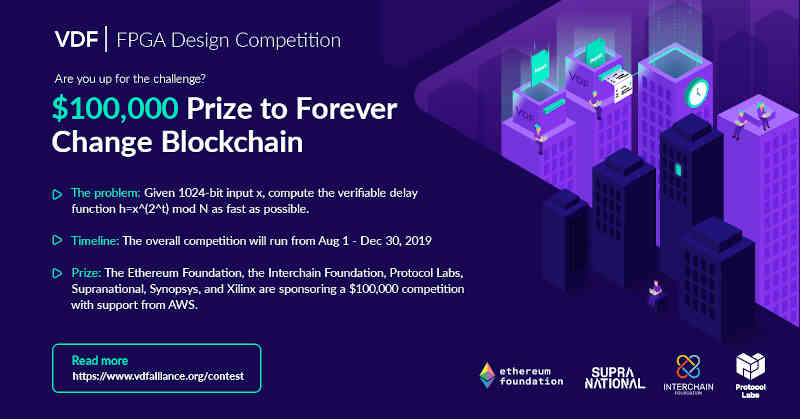| $100,000 On Offer To Invent Block Chain Algorithm |
| Written by Mike James | |||
| Saturday, 03 August 2019 | |||
|
The challenge is specified as a calculation that you have to implement. It is easy to understand and, if it can be done in a reasonable time, it will make blockchains much more efficient. The core of the challenge is a VDF. If you haven't heard of a VDF this isn't surprising as they were only invented in June 2018. A verifiable delay function (VDF) is a cryptographic primitive yielding verifiable time delays through sequential computation. You can use them to create the sort of random delay that previously a proof-of-work calculation would yield. The idea is that to get to a result you have to perform a repeated calculation that takes roughly a given amount of time. What is important is that there should be no shortcut to computing it. In particular, it should not be possible to parallelize. It is assumed that a suitable candidate VDF should only be speeded up by a factor of 10 or less. This is what the competition, organized by the VDF Alliance, is all about. Can you speed up the proposed VDF? The competition, which runs from now to December 30th, is to design an FPGA - a piece of custom hardware - but as far as I can see you can use whatever method you care to as long as it is fast.
The problem is: Given ??a 1024-bit input x, compute the verifiable delay function ‘h=x^(2^t) mod N’ as fast as possible. t=2^30 N=124066695684124741398798927 Why is this so important now? The answer is: Their use is being incorporated into blockchain protocols such as Ethereum, the second largest blockchain platform in the world, and Filecoin, an upcoming platform offering decentralized storage. However, to retain the security properties provided by their computational delay, VDF evaluations must run fast enough to avoid attacks that jeopardise their tether to real-world time. Specifically, an attacker should not be able to evaluate VDFs significantly faster than the general public, e.g. no more than 10 times faster. This might go some way to minimizing the 850Megawatts of power the Ethereum blockchain consumes every year. The contest is organized by the VDF Alliance: The VDF Alliance began in early 2019 to evaluate the feasibility of developing fast, open, hardware for computing Verifiable Delay Functions (VDFs). To begin, the team developed CPU and FPGA implementations of an RSA VDF to better understand their potential for hardware acceleration. These implementations were used to solve a 20-year-old cryptographic puzzle at MIT in two months. Now the VDF Alliance is open-sourcing these designs and inviting the community to make them even faster. Although the challenge is set in terms of building special hardware, it is possible that there are software-based ways of speeding it up. It is also possible that there are mathematical shortcuts, but this seems more unlikely.
In Round 1 the first place winner (the contestant with the lowest latency) will receive $3000 for each nanosecond improvement over the Round 1 baseline, which is set at 50ns. You can read more about the contest at the VDF Alliance website. It strikes me that if you can find a way to compute the VDF in a stupidly short time you might well earn more than $100,000 by keeping it to yourself until the technology is widely adopted, but these are not the thoughts that occur to an honest programmer. On the other hand, you have to open source your attempts so you need to think carefully about what you are selling and at what price. More InformationRelated ArticlesInside Bitcoin - virtual currency Bitcoin Almost Crashed - But Lived To Crash Another Day Bitcoin - A Failed Experiment. Inside Bitcoin - The Block Chain Bitcoin Difficulty Jumps - A 50% Miner Is Possible Linux Foundation Backs Blockchain Project Replace By Fee - Bitcoin Modifications Bitcoin Fork Due To Algorithmic Differences Bitcoin Isn't As Anonymous As You Might Hope The True Cost Of Bugs - bitcoin Errors
To be informed about new articles on I Programmer, sign up for our weekly newsletter, subscribe to the RSS feed and follow us on Twitter, Facebook or Linkedin.
Comments
or email your comment to: comments@i-programmer.info
|
|||
| Last Updated ( Saturday, 03 August 2019 ) |




